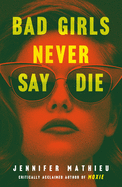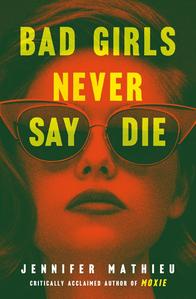
 More than a half century since the 1967 publication of S.E. Hinton's The Outsiders, the beloved young adult novel's message about the perniciousness of classism--delivered by an almost entirely male cast--still needs broadcasting. With Bad Girls Never Say Die, Jennifer Mathieu has rather ingeniously taken the social dynamics of The Outsiders and refocused them on a pack of teenage girls whose low status in 1964 Houston is both a mark against their future prospects and a unifying force.
More than a half century since the 1967 publication of S.E. Hinton's The Outsiders, the beloved young adult novel's message about the perniciousness of classism--delivered by an almost entirely male cast--still needs broadcasting. With Bad Girls Never Say Die, Jennifer Mathieu has rather ingeniously taken the social dynamics of The Outsiders and refocused them on a pack of teenage girls whose low status in 1964 Houston is both a mark against their future prospects and a unifying force.
Fifteen-year-old narrator Evie Barnes, who lives with her mother and grandmother, considers her four-girl posse at Eastside High her true family: "In my mind we're four corners of a tiny square, drawn close to protect ourselves from the rest of the world." But Evie's friends aren't there to protect her the night Preston Fowler, a rich River Oaks boy, tries to rape her outside the bathroom at the Winkler Drive-In. Her unlikely rescuer is Diane Farris, who Evie comes to think of as "this strange girl from the right side of the tracks who had the guts to save my life." Diane's only recourse against Preston was a switchblade, and using it proved fatal.
After the girls flee the murder scene, they lie low and bond over their predicament, although for Evie there persists a central mystery about Diane: why a "tea sipper" like her is living with her alcoholic aunt and going to Evie's school. A few days after the murder, the cops pick up an Eastside boy, and hence an easy target, as a suspect; as Evie puts it, "Who was going to believe a bunch of kids from the wrong side of the tracks over tea sippers with daddies in important places?" Still, Evie is reluctant to come forward with the truth: "What if the cops don't believe that Preston was trying to hurt me? What if they think Diane and I were just making it up? Or worse, that I asked for Preston to mess with me?"
Bad Girls Never Say Die offers a guided tour through outdated thinking about gender, especially the idea that it's the girl's fault when she's pursued by an aggressively libidinous male. The book has some stock characters, but Mathieu (Moxie) is supremely good at getting at the intuitive feminism of the disadvantaged teenage girls anchoring her story. Bad Girls Never Say Die isn't a corrective to Hinton's timeless work; it's a worthy expansion. --Nell Beram, freelance writer and YA author
Shelf Talker: Teenage girls are at the center of this inspired feminist spin on S.E. Hinton's beloved young adult novel, The Outsiders.

